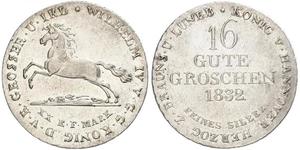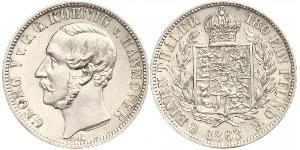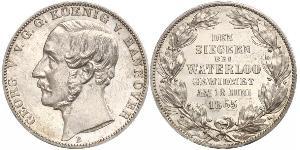16 Groschen (售价 $33.0)
1827, Hannover (Kingdom), William IV. Silver 16 Gute Groschen Coin. Damaged VF!
Mint Year: 1827 References: KM-145.5. Denomination: 16 Gute Groschen Condition: Damaged/tooled (hammered) edge, otherwise VF! Material: Silver (.993) Weight: 10.46gm Diameter: 30mm
Obverse: Leaping horse left. A few stones and hidden engraver`s initial (M) on the ground below. Legend: GEORGIUS IV . D . G . BRITANN . ET HANNOV . REX
Reverse: Large value numeral (16) above denomination (GUTE GROSCHEN), date (1827). Legend: BRUNSVICENSIS ET LUNEBURGENSIS DUX . / FEINES SILBER
William IV (William Henry; 21 August 1765 – 20 June 1837) was King of the United Kingdom of Great Britain and Ireland and of Hanover from 26 June 1830 until his death. William, the third son of George III and younger brother and successor to George IV, was the last king and penultimate monarch of the House of Hanover.
He served in the Royal Navy in his youth and was, both during his reign and afterwards, nicknamed the "Sailor King". He served in North America and the Caribbean, but saw little actual fighting. Since his two older brothers died without leaving legitimate issue, he inherited the throne when he was 64 years old. His reign saw several reforms: the poor law was updated, child labour restricted, slavery abolished in nearly all the British Empire, and the Reform Act 1832 refashioned the British electoral system. Though William did not engage in politics as much as his brother or his father, he was the last monarch to appoint a Prime Minister contrary to the will of Parliament. Through his brother, the Viceroy of Hanover, he granted that kingdom a short-lived liberal constitution.
At his death William had no surviving legitimate children, though he was survived by eight of the ten illegitimate children he had by the actress Dorothea Jordan, with whom he cohabited for 20 years. William was succeeded in the United Kingdom by his niece, Queen Victoria, and in Hanover by his brother, Ernest Augustus I.

|
发布人:
anonymous 2019-01-17 |
|
||
|
||
|
||
|
||
|
||
1 Soldo 教皇国 (754 - 1870) Pope Pius IX (1792- 1878)
本组有 10 钱币 / 7 售价
⇑




 Deutsch
Deutsch Русский
Русский Українська
Українська English
English Italiano
Italiano Français
Français Español
Español 汉语
汉语





-300-150-s0J_AAEBbV4AAAElOppzfAQA.jpg)







